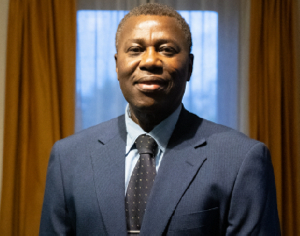President Akufo-Addo has said government recognises the crucial role of Micro, Small and Medium-Scale Enterprises (MSMEs) at the frontline of Ghana’s transformational agenda to drive faster economic growth.
“MSMEs must, and should be the driving forces of our economy as they are critical enablers for employment, and represent a source of wealth creation, national innovation and human empowerment,” he said.
He said this in a speech read on his behalf by Professor George Gyan Baffour, the Minister of Planning, during the opening session of the Second Edition of Accra Sustainable Development Goals (SDGs) Investment Fair 2019.
The fair, which was on the theme: “Sustainable Development Financing: Building Mutually Beneficial Partnerships,” aimed at encouraging private financing of the SDGs.
It was also an opportunity for established businesses to interact with potential investors, whilst providing a platform for start-ups to showcase their products, and attract the necessary funding required for expansion and growth.
President Akufo-Addo said the fair, “provides us with a good opportunity to review progress, and to fast-track the implementation of the global framework for financing sustainable development.”
This year, he said Ghana presented her first ever voluntary national review to the United Nations, and “it is worth mentioning that the report is receiving global commendation.”
He also said his government was committed to developing the infrastructure and manufacturing bases to put the country on a robust footing for rapid economic take-off.
“As we move towards developing our infrastructure and strengthening our manufacturing sectors, we are guided by the fact that digitalisation will impact greatly how we produce, trade and source the needed financing to expand our industries,” he added.
He said the SDG Agenda 2030 calls for increased partnerships between governments, private sector, research institutions, academia and civil society organisations.
He said the partnership prioritised under SDG 17 was expected to ensure that, “we make the right choices from now, to enhance the quality of life for the generation yet unborn.”
He said government was also committed to implementing AU Agenda 2063, which summarises Africa’s aspirations for the future and identifies strategic programmes aimed at boosting Africa’s socio-economic growth and development.
President Akufo-Addo added that Government had identified eight pillars to assist in consolidating macroeconomic stability and fiscal performance gains achieved in the last three years.
This is aimed at helping to transform the national economy.
The pillars include; domestic revenue mobilisation, business regulatory reforms, intensified drive for foreign direct investment, digitisation, accelerated infrastructure development, international financial services centre, enhanced financial support to local enterprises and science and technology.
Mr Ken Ofori-Atta, the Minister for Finance, said the government realising that resource alone could not ensure comprehensive implementation of the SDGs by 2030, has rolled out a number of initiatives to direct private capital into the sustainable development space, of which, the Accra SDGs Investment Fair was one of them.
The SDG financing gap is estimated at 2.5 dollars to 3 trillion dollars per year which he said governments across the world were partnering with the private sector to close.
According to the 2019 Global Wealth Report by Credit Suisse, global wealth grew during the past year by 2.6 per cent to 360 trillion dollars, and this, analysts say, was one of the main reasons for the recent focus on private capital for sustainable development.
“This is a proof that the global private sector has the capacity to help governments finance the implementation of the Sustainable Development Goals,” Mr Ofori-Atta added.
He encouraged both local and foreign businesses and financial institutions to support the financing of the SDGs by directly collaborating with the government.
He called on them to inject funds into private sector projects and businesses that have the potential to bring Shared Value.
He also urged them to lead in the discussions to tackle the challenges with the global financial architecture, which disadvantages countries in the South.
Business News of Saturday, 30 November 2019
Source: ghananewsagency.org













